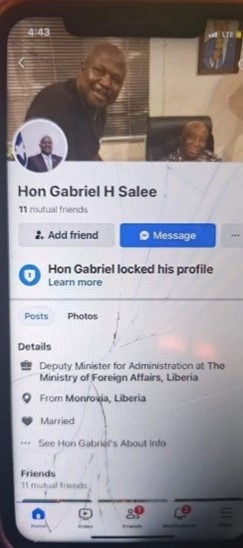A Liberian Facebook Fraudster’s Confession and Apology: A Case Study of Economic Hardship and Online Deception
In the heart of Monrovia, Liberia, a story of online deception unfolded, highlighting the intersection of economic hardship and the allure of quick riches through fraudulent means. Varney Burphy, a resident of the impoverished West Point community, found himself entangled in a web of deceit, creating a fake Facebook account in the name of Deputy Minister Gabriel Sarlee to extort money from unsuspecting individuals, particularly women. Burphy’s confession and subsequent apology shed light on the desperate measures some individuals resort to in the face of overwhelming economic challenges.
Burphy’s modus operandi involved meticulously crafting a fake Facebook profile using Minister Sarlee’s publicly available photos, name, and other personal information. He then initiated conversations with women, feigning romantic interest and gradually building a rapport. Once a certain level of trust was established, he would request nude pictures and videos, intending to use them as leverage for extortion. His actions, driven by the desire to escape the clutches of poverty, demonstrated a calculated manipulation of social media for personal gain.
Upon his arrest by the Liberian National Police and subsequent transfer to the Monrovia City Court, Burphy pleaded guilty to extortion. While expressing remorse for his actions, he attributed his criminal behavior to the dire economic circumstances prevalent in Liberia. He painted a picture of a nation grappling with economic stagnation and widespread poverty, where survival often necessitates resorting to desperate measures. Burphy’s justification, while not excusing his crime, offered a glimpse into the harsh realities faced by many Liberians, where economic hardship can drive individuals to make morally questionable choices.
Burphy’s case underscores the growing concern of online fraud and the misuse of social media platforms for criminal activities. The anonymity offered by the internet, coupled with the ease of creating fake profiles and disseminating misinformation, creates a fertile ground for scammers and fraudsters. This incident serves as a cautionary tale, highlighting the importance of online vigilance and the need for individuals to exercise caution when sharing personal information or engaging in online relationships.
The incident also raises broader questions about the socio-economic context that breeds such criminal behavior. Liberia, a nation grappling with historical and contemporary economic challenges, faces high rates of unemployment and poverty. The lack of opportunities and the struggle for basic survival can create an environment where individuals are more likely to engage in illicit activities, including online fraud. Addressing the root causes of poverty and creating economic opportunities for all citizens is crucial to mitigating the prevalence of such crimes.
Burphy’s confession and apology, while offering a glimpse into the mind of a perpetrator, should not overshadow the impact of his actions on the victims. The emotional distress and potential long-term psychological consequences of being targeted in such scams can be substantial. The incident underscores the need for stronger law enforcement measures to combat online fraud and protect vulnerable individuals from becoming victims of such crimes. Moreover, it emphasizes the importance of public awareness campaigns to educate individuals about the risks of online scams and empower them to protect themselves from such threats. By fostering a culture of online safety and addressing the underlying socio-economic factors that contribute to criminal behavior, societies can work towards creating a safer and more equitable digital landscape.














